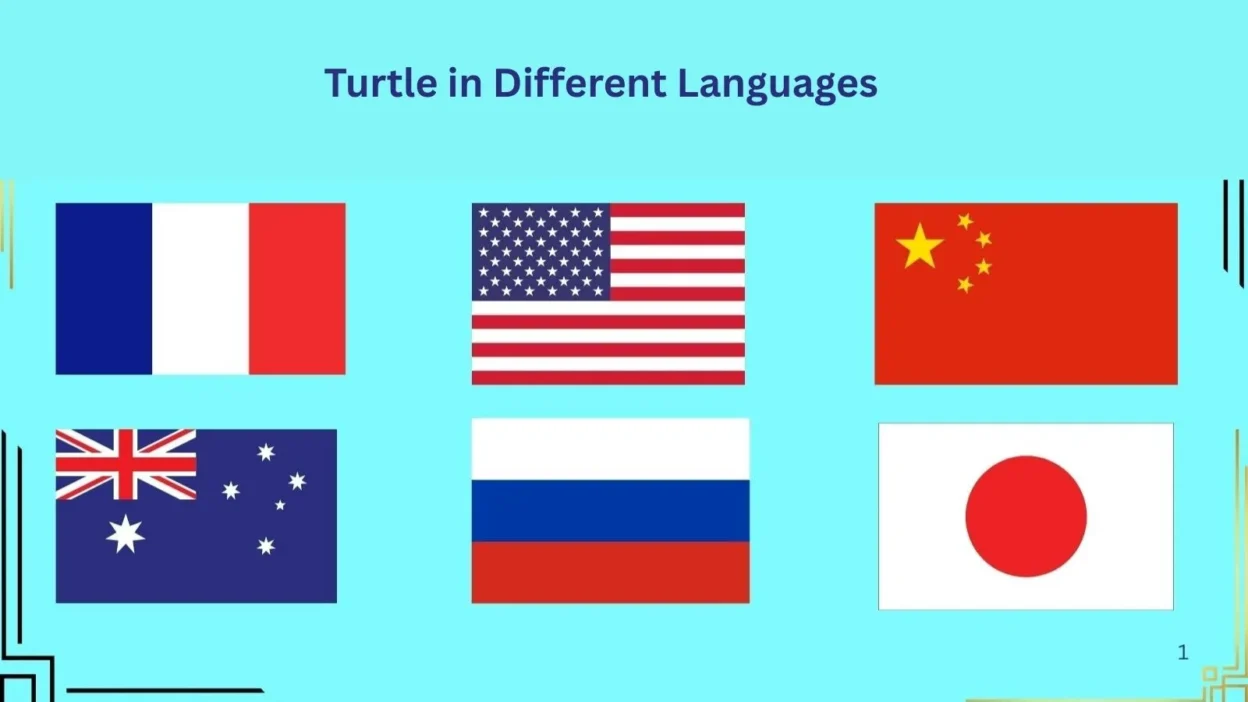Why You’re Searching for “Turtle in Different Languages”
Have you ever found yourself wondering how to say turtle in French, Japanese, or Spanish? Maybe you’re learning a new language, working on a cultural project, traveling, or simply curious about how this gentle, wise creature is represented across the globe.
If you’ve landed on this page, your search is probably fueled by a love for animals, languages, or both — and you’re looking for accurate translations that can help you connect better in conversation or writing.
In this article, we will not only give you the translations of the word turtle in various languages, but also help you understand its meaning and how to use it naturally when speaking or writing.
Whether you’re preparing a multilingual kids’ book, exploring animal vocabulary, or traveling abroad, this guide will solve your problem by providing a quick, clear reference.
What Does the Word Turtle Mean?
The word turtle refers to a reptile known for its hard shell and slow movements. Turtles live in various habitats — from oceans to rivers to dry lands — and are often seen as symbols of patience, wisdom, and longevity in many cultures.
Turtles can be:
- Aquatic (live in water) — often called sea turtles
- Semi-aquatic (live in water and on land)
- Terrestrial (live on land) — sometimes called tortoises in English
When translating the word turtle, some languages differentiate between sea turtles and land turtles, while others use the same word for both.
Turtle in 40+ Different Languages
| Language | Word for Turtle | Pronunciation (if helpful) |
| Arabic | سلحفاة (Sulḥafāh) | sul-ha-fa |
| Chinese (Mandarin) | 乌龟 (Wūguī) | woo-gway |
| French | Tortue | tor-tew |
| Spanish | Tortuga | tor-too-ga |
| German | Schildkröte | shilt-kruh-te |
| Italian | Tartaruga | tar-ta-roo-ga |
| Japanese | 亀 (Kame) | kah-meh |
| Korean | 거북이 (Geobugi) | gaw-boo-gi |
| Hindi | कछुआ (Kachhua) | kach-hwa |
| Urdu | کچھوا (Kachwa) | kach-wa |
| Russian | Черепаха (Cherepakha) | che-re-pah-kha |
| Portuguese | Tartaruga | tar-ta-roo-ga |
| Turkish | Kaplumbağa | kap-loom-bah |
| Swahili | Kasa | kah-sa |
| Greek | Χελώνα (Chelóna) | khe-lo-na |
| Hebrew | צב (Tzav) | tsav |
| Dutch | Schildpad | shilt-paad |
| Thai | เต่า (Tao) | tao |
| Vietnamese | Rùa | roo-ah |
| Polish | Żółw | zhoov |
| Bengali | কচ্ছপ (Kôchchhôp) | koch-chop |
| Tamil | ஆமை (Āmai) | aa-mai |
| Malay | Penyu | pen-yoo |
| Filipino (Tagalog) | Pagong | pah-gong |
| Indonesian | Kura-kura | koo-rah koo-rah |
| Romanian | Țestoasă | tses-twah-sah |
| Hungarian | Teknős | tek-nyosh |
| Finnish | Kilpikonna | keel-pee-kon-na |
| Swedish | Sköldpadda | shuhld-pahd-da |
| Norwegian | Skilpadde | shill-pah-deh |
| Danish | Skildpadde | shild-pah-de |
| Ukrainian | Черепаха (Cherepakha) | che-re-pah-kha |
| Nepali | कछुवा (Kachhuwa) | kach-hoo-wa |
| Serbian | Корњача (Kornjača) | kor-nya-cha |
| Croatian | Kornjača | kor-nya-cha |
| Bosnian | Kornjača | kor-nya-cha |
| Azerbaijani | Tısbağa | tis-ba-gha |
| Georgian | კუ (Ku) | koo |
| Persian (Farsi) | لاکپشت (Lakposht) | lak-posht |
How to Use the Word “Turtle” in Sentences
Here are a few simple examples you can apply or translate:
- I saw a turtle on the beach.
- Turtles move slowly but live long lives.
- The turtle pulled its head inside the shell.
- My favorite animal is the turtle.
- She collects turtle figurines from every country she visits.
You can replace turtle with its translation when using these sentences in other languages.
Why This Helps You: Practical Usage & Cultural Connection
Learning how to say turtle in different languages is more than just vocabulary — it’s about building a deeper connection with cultures, people, and nature. Whether you’re:
- Communicating with international friends
- Writing a multilingual story
- Teaching kids animal names
- Visiting a zoo abroad
- Learning a new language
… this guide equips you with both knowledge and confidence to use the word turtle meaningfully.
Conclusion
The humble turtle might be slow on land, but it moves swiftly across cultures and languages. From tortuga to kame, every translation holds a world of symbolism and linguistic beauty. With this article, your curiosity is satisfied, and you’re now ready to recognize and use the word turtle in over 40 languages.



